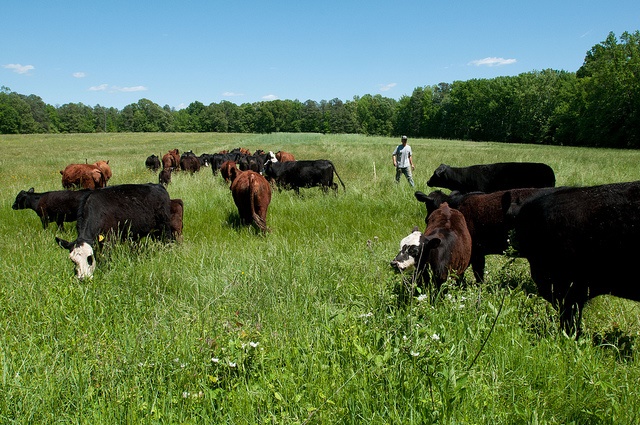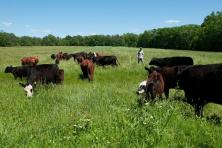This blog was originally posted Nov 20, 2012 by Chad Kruger here. Chad serves as Advisor to the Northwest Biocarbon Intiative and is the Director of Washington State University's Center for Sustaining Agriculture and Natural Resources.
Managing Change Northwest recently brought Allan Savory of the Savory Institute to the Pacific Northwest to speak to the Washington Cattleman’s Association, the Tilth Producers of Washington, and a special workshop and keynote in Seattle for consumers. CSANR co-sponsored Savory’s PNW tour because we thought he brought a challenging message that many in our region needed to hear. Below is the first of a two-part post of my reflections on what Savory had to say when he was here.
Part 1: The Science
Allan Savory is the developer of Holistic Management (HM) a rangeland management system that focuses on the planning and decision-making process to regenerate grassland ecosystem function while balancing economic and social objectives. HM has four principles: 1) nature is complex and functions as a whole; 2) every environment is different; 3) proper management of livestock can improve land health; and 4) timing of grazing is more important than the number of animals per unit of land.
Savory is a controversial character amongst the scientific community, both deservedly and undeservedly. From my perspective, there are three basic reasons: 1) the scientific literature supporting HM is considered by many of his peers to be inconclusive, 2) HM includes some unconventional approaches, and 3) Savory can be less than flattering in his commentary about other scientists and scientific institutions.
Savory has been the target of some fairly harsh criticism within the rangeland science community, none more critical than a paper by Briske et.al. (2008) concluding that the experimental record for short-durational grazing systems (that they consider equivalent to HM) was inconclusive and therefore doesn’t support HM recommendations. They conclude that most of the science used to support management recommendations for these systems is either anecdotal or statistically inconclusive because the experiments were poorly designed (they didn’t isolate single variables for analysis). Savory and his closest proponents (Teague et.al. 2008 – strangely, a co-author on Briske et.al. 2008) have provided rebuttals arguing that Briske et.al. mis-represented HM in their study sample and that their conclusions are, consequently, not relevant. While I don’t think that critiques are necessarily a definite dismissal of the legitimacy of HM, I do think they raise an extremely valid question … “Where’s the data?”
In his defense, while Savory was a research biologist early in his career and did publish on his rotational grazing work in the late 70’s and early 80’s, for the past 30 years he has been much more concerned about practicing sustainable (or regenerative, as he likes to say) land management than he has been about rigorous experimental design and data analysis. So it’s true that for the most prominent portions of Savory’s career, his science has largely been anecdotal (powerful as his “before and after” photos may be) rather than statistically conclusive scientific analysis. This is a problem because …
… Savory promotes a very unconventional approach to land management such as seemingly outlandish recommendations for such decisions as high stocking densities. In his presentations last weekend, Savory described situations where stocking densities were increased by 400% – arguing that this was a key driver in turning deserts into lush savannah landscapes (and he showed very compelling pictures of the results!). The scientific theories underlying HM are not in question – mimicking natural (i.e. pre-historic) herbivore-rangeland systems should lead toward the best possible environmental outcome. However, visual (and therefore anecdotal) evidence is simply not the same as presenting rigorous quantitative results that enables scientific peers to validate the results. Without the data, we simply can’t parse out the variables that contributed to the improvement in ecosystem conditions or functions.
In his talks this past weekend, Savory claimed that “reductionist science” will never capture what he has accomplished with holistic management, but I’m not convinced this is the case and I know there are many other scientists who agree with me. Being “unconventional” is not, in itself, a problem, but when what you are arguing for is unconventional, you’d better “bring data”. Scientific pioneers are, by definition, working against convention and the burden of proof rests on them to demonstrate that they are right when everyone else thinks they are wrong. There is no question that this kind of ecosystem science is challenging, and expensive, and that strictly using reductionist experimental approaches will likely be inconclusive. That’s why most of the more complex ecosystem services studies undertaken in recent years (like the work we are doing on agriculture and climate change) blend holistic process modeling approaches with targeted experimentation.
This leads us to my final reason why Savory is controversial in the scientific community – he is a bit harsh in his judgments of scientific institutions and our responses to his unconventional wisdom. On several occasions this past weekend he described institutions as “water tight to new information”. He’s partially right. Humans, by nature, tend to gravitate toward institutional structure and organization, and the institutions we create do tend to be very reticent to accept new ways of thinking (whether there is supporting evidence or not). However, scientific institutions are one of the few that incentivize and reward their members for new discovery and for rigorous experimentation and testing of new ideas (that’s why we exist). So what better place is there to debate the scientific merits (theoretical and empirical) of a given idea? In my experience, scientific institutions are one of the few places where unconventional ideas ever see the light of day.
My first encounter with Savory’s ideas were as a youth were helping my father cross-fence our ranch so that we could better plan and manage our grazing (in response to this guy named Savory). My first academic encounter with his ideas were as a graduate student when the faculty I worked with (across multiple disciplines in multiple regions of the country) were wrestling with his ideas and engaging in discussions about whether HM might apply to non-rangeland dimensions of agricultural research and management. While I know Savory has been unfairly criticized in certain scientific circles within the academic institutions, I think that many of the rest of us are just looking for more rigorous supporting evidence that can be replicated under other circumstances because we find his ideas compelling. And, for that, we need more data….
I’ll follow up with a second part of this post that focuses more on the philosophical ideas that he presented.

